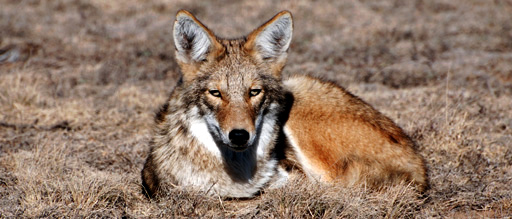
Coyote Credit: USFWS
Nearly two-thirds of Nevadans polled want the Board of Wildlife Commissioners to ban the brutal competition
September 25, 2025 - LAS VEGAS—This Thursday, concerned citizens from across Nevada will attend a meeting of the Nevada Board of Wildlife Commissioners Contest Committee to advocate for a ban on wildlife killing contests. These controversial events reward participants for killing the most, the heaviest, or even the smallest animals for cash and prizes.
Rebecca Goff, Nevada state director for the Humane Society of the United States, will deliver a presentation addressing the impact of these contests on local wildlife. In addition, advocates and residents will deliver public comments in support of a statewide ban. The meeting is scheduled for September 26 at 6:00 p.m. in Room 165 of the Nevada Legislature Office Building, 7230 Amigo Street in Las Vegas.
A recent poll conducted by the bipartisan firm Remington Research Group and commissioned by the Humane Society of the United States finds that 71% of Nevada residents support a ban on killing contests by the Board of Wildlife Commissioners. The poll found consistently strong support for a ban across gender, ideological, political party and Congressional district lines.
About 15 wildlife killing contests are held in Nevada each year, targeting native species including coyotes, bobcats and foxes. Last year, HSUS undercover investigators attended two Nevada killing contests and witnessed an alarming disregard for suffering.
At the culmination of the “Cold Springs Station Overnight Coyote Derby” in Fallon, participants dragged approximately 60 dead coyotes along the blood-soaked ground, cutting slits in their legs to hang and weigh them for prizes. When asked why he participates in the contests, a participant replied: “Being able to shoot as many as I f**** want. And kill s***. The itch to kill something. Better than people.”
At the weigh-in of the “9th Annual Coyote Ball” at the Wayside Bar in Reno, a participant exclaimed, “The blood will flow!” as blood ran along a gutter, and others described using night vision and thermal imaging scopes and driving from location to location while playing electronic calling devices that mimicked the sounds of coyote pups or prey in distress to lure animals near the truck to shoot.
“Treating Nevada’s native wildlife like disposable pieces in a cash-and-prizes game is shameful and does not reflect our state’s values,” said Goff. “Ten states nationwide, including six of our Western neighbors, have outlawed these gruesome competitions, yet Nevada still allows them. Our Board of Wildlife Commissioners must act now to stop this cruel and senseless killing of wildlife who are essential to the balance of our ecosystem.”
On March 8, 2024, Goff delivered a presentation and a petition for rulemaking on behalf of the HSUS for a killing contest ban to a meeting of the Nevada Board of Wildlife Commissioners. The petition included a detailed listing of killing contests in the state, substantial citations to peer-reviewed research finding that killing contests have no wildlife management value, and numerous statements of support from top wildlife professionals, scientists and hunters in Nevada and across the U.S.
However, the Board declined to even consider a proposed rule. In light of this recent poll, the grisly investigation results and the overwhelming scientific evidence presented to support a ban, the Board’s Contest Committee should heed the wishes of its constituents and recommend that the Board move forward with a new rule to end wildlife killing contests in the Silver State.
Background
-
As these contests continue across Nevada, the consequences extend beyond the immediate slaughter, removing ecologically vital native species and raising ethical concerns among wildlife professionals.
-
Killing contests take place across Nevada including in Tonopah, Searchlight, Elko, McGill, Fish Lake Valley, Panaca, Winnemucca, Midas, Las Vegas, Carvers, Battle Mountain, Austin, Reno, Fallon, Stagecoach, Pioche, Hawthorne, Henderson, Caliente, Spring Creek and Round Mountain.
-
Hunters and wildlife management professionals across the U.S. have called out killing contests as unethical and warned they are damaging the reputation of hunters and threatening the future of hunting.
-
Scientific evidence shows that indiscriminate killing of coyotes, such as in these contests, will not reduce their numbers, prevent conflicts on farms, or boost populations of game species like deer for hunters. It can disrupt coyote pack structures, potentially increasing conflicts and coyote numbers.
-
According to the U.S. Fish and Wildlife Service, only 3.4% of Nevada residents held a paid hunting license in 2024. Yet currently there is no representation on the Board of Wildlife Commissioners for the 96.6% of Nevada residents who do not hunt.
-
Wildlife killing contests have now been banned in Arizona, Colorado, Oregon, Washington, New Mexico, California, Vermont, Massachusetts, Maryland and New York.
Download the Investigation Report
Source: Humane Society of the United States








